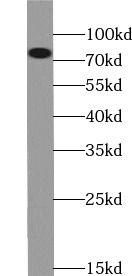Products
PKC alpha antibody
Category:
Research Area:
| Synonyms: | AAG6 antibody, PKC A antibody, PKC alpha antibody, PKCA antibody, PRKACA antibody, PRKCA antibody, Protein kinase C alpha type antibody, protein kinase C antibody, alpha antibody | ||
| Catalogue No.: | FNab06480 | Reactivity: | Human |
| Host: | Rabbit | Tested Application: | ELISA, WB, IHC, IF |
| Clonality: | polyclonal | Isotype: | IgG |
- SPECIFICATIONS
- Product Name
- PKC alpha antibody
- Catalogue No.
- FNab06480
- Size
- 100μg
- Form
- liquid
- Purification
- Immunogen affinity purified
- Purity
- ≥95% as determined by SDS-PAGE
- Clonality
- polyclonal
- Isotype
- IgG
- Storage
- PBS with 0.02% sodium azide and 50% glycerol pH 7.3, -20℃ for 12 months (Avoid repeated freeze / thaw cycles.)
Immunogen
- Immunogen
- protein kinase C, alpha
- Alternative Names
- AAG6 antibody, PKC A antibody, PKC alpha antibody, PKCA antibody, PRKACA antibody, PRKCA antibody, Protein kinase C alpha type antibody, protein kinase C antibody, alpha antibody
- UniProt ID
- P17252
- Observed MW
- 77 kDa
Application
- Tested Applications
- ELISA, WB, IHC, IF
- Recommended dilution
- WB: 1:500 - 1:2000; IHC: 1:50 - 1:200; IF: 1:50 - 1:200
Validated Images
 Jurkat cells were subjected to SDS PAGE followed by western blot with FNab06480(PRKCA antibody) at dilution of 1:1000
Jurkat cells were subjected to SDS PAGE followed by western blot with FNab06480(PRKCA antibody) at dilution of 1:1000
 Immunohistochemistry of paraffin-embedded human thyroid cancer tissue slide using FNab06480( PRKCA Antibody) at dilution of 1:200
Immunohistochemistry of paraffin-embedded human thyroid cancer tissue slide using FNab06480( PRKCA Antibody) at dilution of 1:200
 Immunofluorescent analysis of ( -20℃ Ethanol ) fixed HeLa cells using FNab06480( PRKCA Antibody) at dilution of 1:50 and Alexa Fluor 488-conjugated AffiniPure Goat Anti-Rabbit IgG(H+L)
Immunofluorescent analysis of ( -20℃ Ethanol ) fixed HeLa cells using FNab06480( PRKCA Antibody) at dilution of 1:50 and Alexa Fluor 488-conjugated AffiniPure Goat Anti-Rabbit IgG(H+L)
- Background
- Protein kinase C (PKC) is a family of serine- and threonine-specific protein kinases that can be activated by calcium and the second messenger diacylglycerol. PKC family members phosphorylate a wide variety of protein targets and are known to be involved in diverse cellular signaling pathways. PKC family members also serve as major receptors for phorbol esters, a class of tumor promoters. Each member of the PKC family has a specific expression profile and is believed to play a distinct role in cells. The protein encoded by this gene is one of the PKC family members. This kinase has been reported to play roles in many different cellular processes, such as cell adhesion, cell transformation, cell cycle checkpoint, and cell volume control. Knockout studies in mice suggest that this kinase may be a fundamental regulator of cardiac contractility and Ca(2+) handling in myocytes.



